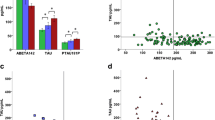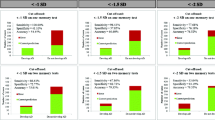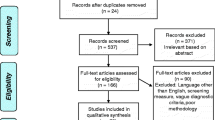Abstract
A rapid increase in the number of patients with Alzheimer’s disease (AD) is expected over the next decades. Accordingly, there is a critical need for early-stage AD detection methods that can enable effective treatment strategies. In this study, we consider the ability of episodic-memory measures to predict mild cognitive impairment (MCI) to AD conversion and thus, detect early-stage AD. For our analysis, we studied 307 participants with MCI across four years using data from the Alzheimer’s Disease Neuroimaging Initiative (ADNI). Using a binary logistic regression, we compared episodic-memory tests to each other and to prominent neuroimaging methods in MCI converter (MCI participants who developed AD) and MCI non-converter groups (MCI participants who did not develop AD). We also combined variables to test the accuracy of mixed-predictor models. Our results indicated that the best predictors of MCI to AD conversion were the following: a combined episodic-memory and neuroimaging model in year one (59.8%), the Rey Auditory Verbal Learning Test in year two (71.7%), a mixed episodic-memory predictor model in year three (77.7%) and the Logical Memory Test in year four (77.2%) of ADNI. Overall, we found that individual episodic-memory measure and mixed models performed similarly when predicting MCI to AD conversion. Comparatively, individual neuroimaging measures predicted MCI conversion worse than chance. Accordingly, our results indicate that episodic-memory tests could be instrumental in detecting early-stage AD and enabling effective treatment.


Similar content being viewed by others
Availability of data and materials
This data is available via application to the Alzheimer’s Disease Neuroimaging Initiative (ADNI). Data collection and sharing for this project was funded by ADNI (National Institutes of Health Grant U01 AG024904) and DOD ADNI (Department of Defence award number W81XWH-12-2-0012). ADNI is funded by the National Institute on Aging, the National Institute of Biomedical Imaging and Bioengineering, and through generous contributions from the following: AbbVie, Alzheimer’s Association; Alzheimer’s Drug Discovery Foundation; Araclon Biotech; BioClinica, Inc.; Biogen; Bristol-Myers Squibb Company; CereSpir, Inc.; Cogstate; Eisai Inc.; Elan Pharmaceuticals, Inc.; Eli Lilly and Company; EuroImmun; F. Hoffmann-La Roche Ltd and its affiliated company Genentech, Inc.; Fujirebio; GE Healthcare; IXICO Ltd.; Janssen Alzheimer Immunotherapy Research & Development, LLC.; Johnson & Johnson Pharmaceutical Research & Development LLC.; Lumosity; Lundbeck; Merck & Co., Inc.; Meso Scale Diagnostics, LLC.; NeuroRx Research; Neurotrack Technologies; Novartis Pharmaceuticals Corporation; Pfizer Inc.; Piramal Imaging; Servier; Takeda Pharmaceutical Company; and Transition Therapeutics. The Canadian Institutes of Health Research is providing funds to support ADNI clinical sites in Canada. Private sector contributions are facilitated by the Foundation for the National Institutes of Health (www.fnih.org). The grantee organisation is the Northern California Institute for Research and Education, and the study is coordinated by the Alzheimer’s Therapeutic Research Institute at the University of Southern California. ADNI data are disseminated by the Laboratory for Neuro Imaging at the University of Southern California.
Code availability
Not applicable.
References
Abikoff H, Alvir J, Hong G et al (1987) Logical memory subtest of the wechsler memory scale: age and education norms and alternate-form reliability of two scoring systems. J Clin Exp Neuropsychol 9:435–448. https://doi.org/10.1080/01688638708405063
Alzheimer’s Association (2018) 2018 Alzheimer’s disease facts and figures. Alzheimers Dement 14:367–429
Alzheimer’s Disease Neuroimaging Initiative (2008) ADNI2 Procedures Manual. In: Alzheimers Dis. Neuroimaging Initiat. https://adni.loni.usc.edu/wp-content/uploads/2008/07/adni2-procedures-manual.pdf. Accessed 30 Jan 2021
Alzheimer’s Disease Neuroimaging Initiative (2016) ADNI3 Protocol. http://adni.loni.usc.edu/wp-content/themes/freshnews-dev-v2/documents/clinical/ADNI3_Protocol.pdf. Accessed 11 Apr 2019
Alzheimer’s Disease Neuroimaging Initiative (2017) ADNI MRI Tool. http://adni.loni.usc.edu/methods/mri-tool/. Accessed 11 Dec 2019
Arevalo-Rodriguez I, Smailagic N, Roqué I, Figuls M et al (2015) Mini-Mental State Examination (MMSE) for the detection of Alzheimer’s disease and other dementias in people with mild cognitive impairment (MCI). Cochrane Database Syst Rev. https://doi.org/10.1002/14651858.CD010783.pub2
Athinoula A (2019) Martinos Center for Biomedical Imaging Free Surfer Wiki. https://surfer.nmr.mgh.harvard.edu/fswiki. Accessed 11 Dec 2019
Australian Bureau of Statistics (2017) Causes of death, Australia, 2016. Australian Bureau of Statistics Canberra
Bak TH, Rogers TT, Crawford LM et al (2005) Cognitive bedside assessment in atypical parkinsonian syndromes. J Neurol Neurosurg Psychiatry 76:420–422. https://doi.org/10.1136/jnnp.2003.029595
Banik A, Brown RE, Bamburg J et al (2015) Translation of pre-clinical studies into successful clinical trials for Alzheimer’s disease: what are the roadblocks and how can they be overcome? J Alzheimers Dis JAD 47:815–843. https://doi.org/10.3233/JAD-150136
Bastin C, Salmon E (2014) Early neuropsychological detection of Alzheimer’s disease. Eur J Clin Nutr 68:1192–1199. https://doi.org/10.1038/ejcn.2014.176
Brown J (2015) The use and misuse of short cognitive tests in the diagnosis of dementia. J Neurol Neurosurg Psychiatry 86:680–685. https://doi.org/10.1136/jnnp-2014-309086
Cai S, Huang L, Zou J et al (2015) Changes in thalamic connectivity in the early and late stages of amnestic mild cognitive impairment: a resting-state functional magnetic resonance study from ADNI. PLoS ONE 10:e0115573. https://doi.org/10.1371/journal.pone.0115573
Chapman RM, Mapstone M, McCrary JW et al (2011) Predicting conversion from mild cognitive impairment to Alzheimer’s disease using neuropsychological tests and multivariate methods. J Clin Exp Neuropsychol 33:187–199. https://doi.org/10.1080/13803395.2010.499356
Chu LW (2012) Alzheimer’s disease: early diagnosis and treatment. Hong Kong Med J Xianggang Yi Xue Za Zhi 18:228–237
Crane PK, Carle A, Gibbons LE et al (2012) Development and assessment of a composite score for memory in the Alzheimer’s Disease Neuroimaging Initiative (ADNI). Brain Imaging Behav Indianap 6:502–16. https://doi.org/10.1007/s11682-012-9186-z
De Simone MS, Perri R, Fadda L et al (2019) Predicting progression to Alzheimer’s disease in subjects with amnestic mild cognitive impairment using performance on recall and recognition tests. J Neurol 266:102–111. https://doi.org/10.1007/s00415-018-9108-0
Derby CA, Burns LC, Wang C et al (2013) Screening for predementia AD: time-dependent operating characteristics of episodic memory tests. Neurology 80:1307–1314. https://doi.org/10.1212/WNL.0b013e31828ab2c9
Eckerström C, Olsson E, Bjerke M et al (2013) A combination of neuropsychological, neuroimaging, and cerebrospinal fluid markers predicts conversion from mild cognitive impairment to dementia. J Alzheimers Dis JAD 36:421–431. https://doi.org/10.3233/JAD-122440
El Haj M, Antoine P, Nandrino J-L, Kapogiannis D (2016) Autobiographical memory decline in Alzheimer’s Disease. Ageing Res Rev 27:15–22. https://doi.org/10.1016/j.arr.2016.02.002
Faul F, Erdfelder E, Lang A-G, Buchner A (2007) G*Power 3: A flexible statistical power analysis program for the social, behavioral, and biomedical sciences. Behav Res Methods 39:175–191. https://doi.org/10.3758/BF03193146
Faul F, Erdfelder E, Buchner A, Lang A-G (2009) Statistical power analyses using G*Power 3.1: tests for correlation and regression analyses. Behav Res Methods 41:1149–1160. https://doi.org/10.3758/BRM.41.4.1149
Gainotti G, Quaranta D, Vita MG, Marra C (2014) Neuropsychological predictors of conversion from mild cognitive impairment to Alzheimer’s disease. J Alzheimers Dis JAD 38:481–495. https://doi.org/10.3233/JAD-130881
Gomar JJ, Bobes-Bascaran MT, Conejero-Goldberg C et al (2011) Utility of combinations of biomarkers, cognitive markers, and risk factors to predict conversion from mild cognitive impairment to Alzheimer disease in patients in the Alzheimer’s disease neuroimaging initiative. Arch Gen Psychiatry 68:961–969. https://doi.org/10.1001/archgenpsychiatry.2011.96
Gomar JJ, Conejero-Goldberg C, Davies P et al (2014) Extension and refinement of the predictive value of different classes of markers in ADNI: four-year follow-up data. Alzheimers Dement J Alzheimers Assoc 10:704–712. https://doi.org/10.1016/j.jalz.2013.11.009
Ihara R, Iwata A, Suzuki K et al (2018) Clinical and cognitive characteristics of preclinical Alzheimer’s disease in the Japanese Alzheimer’s Disease Neuroimaging Initiative cohort. Alzheimers Dement Transl Res Clin Interv 4:645–651. https://doi.org/10.1016/j.trci.2018.10.004
Irish M, Lawlor BA, Coen RF, O’Mara SM (2011) Everyday episodic memory in amnestic mild cognitive impairment: a preliminary investigation. BMC Neurosci 12:80. https://doi.org/10.1186/1471-2202-12-80
Jack CR, Albert M, Knopman DS et al (2011) Introduction to revised criteria for the diagnosis of Alzheimer’s disease: national institute on aging and the Alzheimer association workgroups. Alzheimers Dement J Alzheimers Assoc 7:257–262. https://doi.org/10.1016/j.jalz.2011.03.004
Korolev IO, Symonds LL, Bozoki AC, Alzheimer’s Disease Neuroimaging Initiative (2016) Predicting progression from mild cognitive impairment to Alzheimer’s dementia using clinical, MRI, and plasma biomarkers via probabilistic pattern classification. PLoS ONE 11:e0138866. https://doi.org/10.1371/journal.pone.0138866
Larner AJ (2019) Evaluating cognitive screening instruments with the “likelihood to be diagnosed or misdiagnosed” measure. Int J Clin Pract 73:e13265. https://doi.org/10.1111/ijcp.13265
Manly CA, Wells RS (2015) Reporting the use of multiple imputation for missing data in higher education research. Res High Educ 56:397–409. https://doi.org/10.1007/s11162-014-9344-9
Mitchell AJ, Shiri-Feshki M (2009) Rate of progression of mild cognitive impairment to dementia–meta-analysis of 41 robust inception cohort studies. Acta Psychiatr Scand 119:252–265. https://doi.org/10.1111/j.1600-0447.2008.01326.x
Moradi E, Hallikainen I, Hänninen T et al (2017) Rey’s Auditory Verbal Learning Test scores can be predicted from whole brain MRI in Alzheimer’s disease. NeuroImage Clin 13:415–427. https://doi.org/10.1016/j.nicl.2016.12.011
Nathan PJ, Abbott R, Lim YY et al (2016) PT593. CSF Beta-Amyloid and APOE E4 Related Decline in Episodic Memory over 12 months measured using the CANTAB in individuals with amnestic MCI: results from the European-ADNI study. Int J Neuropsychopharmacol 19:18–19. https://doi.org/10.1093/ijnp/pyw044.593
Ottoy J, Niemantsverdriet E, Verhaeghe J et al (2019) Association of short-term cognitive decline and MCI-to-AD dementia conversion with CSF, MRI, amyloid- and 18F-FDG-PET imaging. NeuroImage Clin 22:101771. https://doi.org/10.1016/j.nicl.2019.101771
Rasmussen J, Langerman H (2019) Alzheimer’s disease—why we need early diagnosis. Degener Neurol Neuromuscul Dis 9:123–130. https://doi.org/10.2147/DNND.S228939
Russo MJ, Campos J, Vázquez S et al (2017) Adding recognition discriminability index to the delayed recall is useful to predict conversion from mild cognitive impairment to Alzheimer’s disease in the Alzheimer’s disease neuroimaging initiative. Front Aging Neurosci. https://doi.org/10.3389/fnagi.2017.00046
Seo EH, Choo IH, Alzheimer’s Disease Neuroimaging Initiative (2016) Amyloid-independent functional neural correlates of episodic memory in amnestic mild cognitive impairment. Eur J Nucl Med Mol Imaging 43:1088–1095. https://doi.org/10.1007/s00259-015-3261-9
Sterne JAC, White IR, Carlin JB et al (2009) Multiple imputation for missing data in epidemiological and clinical research: potential and pitfalls. BMJ 338:b2393. https://doi.org/10.1136/bmj.b2393
Sun Z, van de Giessen M, Lelieveldt BPF, Staring M (2017) Detection of conversion from mild cognitive impairment to Alzheimer’s disease using longitudinal brain MRI. Front Neuroinformatics. https://doi.org/10.3389/fninf.2017.00016
Vakil E, Blachstein H (1993) Rey auditory-verbal learning test: structure analysis. J Clin Psychol 49:883–890. https://doi.org/10.1002/1097-4679(199311)49:6%3c883::AID-JCLP2270490616%3e3.0.CO;2-6
Funding
This study would like to acknowledge funding received from the Australian Government Research Training Program and Western Sydney Universities Master of Research Scholarship. Without funding from the Australian Government or Western Sydney University, this project would not have been possible.
Author information
Authors and Affiliations
Consortia
Corresponding author
Ethics declarations
Conflict of interest
The authors of this study declare no conflicts of interest.
Ethical approval
Our study gained ethics approval from Western Sydney Universities Human Research Ethics Committee in March 2019 (H13176).
Consent to participate
Not applicable.
Consent for publication
Not applicable.
Additional information
Communicated by Bill J Yates.
Publisher's Note
Springer Nature remains neutral with regard to jurisdictional claims in published maps and institutional affiliations.
Rights and permissions
About this article
Cite this article
Warren, S.L., Moustafa, A.A., Alashwal, H. et al. Harnessing forgetfulness: can episodic-memory tests predict early Alzheimer’s disease?. Exp Brain Res 239, 2925–2937 (2021). https://doi.org/10.1007/s00221-021-06182-w
Received:
Accepted:
Published:
Issue Date:
DOI: https://doi.org/10.1007/s00221-021-06182-w




